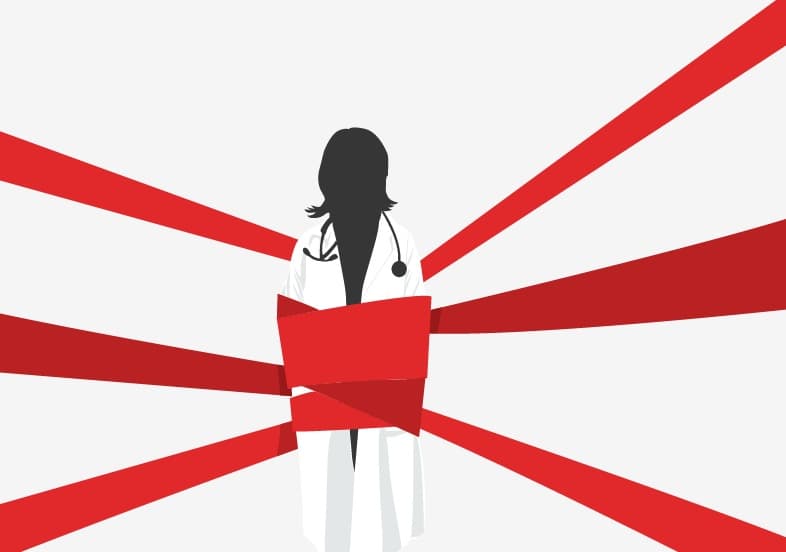Advertisement
Mass. Doctors Join To Vent Frustrations With Electronic Health Records

"Imagine," said Dr. Steven J. Stack, president of the American Medical Association. "In a world where a 2-year-old can operate an iPhone, you have graduate-educated physicians brought to their knees by electronic health records."
Has anyone ever summed up better the monumental frustrations that many doctors encounter when grappling with electronic medical records?
And those frustrations have only been growing as federal requirements for electronic medical records have kicked in and grown teeth — to the point that the AMA has now launched a campaign -- called Break the Red Tape — to call for a pause on new medical-record rules.
As part of that campaign, the Massachusetts Medical Society has called a town hall meeting at its Waltham headquarters Tuesday night to let doctors vent.
Not that it's a Boston Tea Party kind of thing.
"It’s not that every physician wants to throw their electronic medical records into Boston Harbor," said Dr. Dennis Dimitri, president of the Massachusetts Medical Society. "In fact, physicians have been incredibly rapid in their uptake of implementation of electronic medical records. We have over 80 percent in the state now having implemented electronic medical records. But the dissatisfaction comes around the fact that the electronic medical record has not been the panacea that many might have hoped it to be.
"In fact," Dimitri continued, "it has added significant time to the daily life of most physicians in their practices. It has not necessarily lived up to expectations in terms of its ability to provide cues to physicians to make sure that necessary treatments are not being missed. It has certainly not been able to swiftly disseminate information from one clinical setting to another. So those are some of the things we hope we’ll hear about, better understand the problems that face physicians, and then come away from this with a plan of how we ask for help in solving these problems."
Advertisement
That inability to cross from one clinical setting to another that Dimitri mentioned is known by the cumbersome term "interoperability," and even Sen. Elizabeth Warren is talking about it these days.
"Today, after a federal investment of more than $30 billion, most medical records are digital. But there is a huge problem. These programs still don’t talk to each other very well," she said at a recent hearing. "That means that too many patients who try to access their records, or who try to transfer from one doctor to another, can’t do so electronically. This lack of interoperability imposes other costs -- wasted medical tests, wasted time and wasted money."
And meanwhile, where once there were only incentives to adopt electronic medical records, now there are penalties for those who resist or fail.
"More than half of the physicians who bill Medicare in the country are currently being penalized 1 percent of all their payments this year, in 2015, as a result of the Meaningful Use program," AMA President Stack said, referring to the federal standard requiring that electronic medical records be used in certain "meaningful" ways.
"When you have more than a quarter million physicians being penalized by the government, by a single program," he said, "I think that most people will understand the math: It's not the 250,000-plus physicians that are the problem, it's most likely the single program that they are being punished by."
By one estimate, those penalties could already be amounting to $200 million this year.
Massachusetts is not the first state to host an AMA-backed town meeting for airing experiences with electronic medical records. Atlanta hosted one this summer, prompting headlines like "AMA docs fed up with EHR woes."
Dr. Stack says Boston comes next in part because it's such a hotbed of medical technology and innovation. So will Boston tech hotshots unravel the frustrating knots of the electronic medical record problem?
They're already working on it. One of the speakers at the meeting Tuesday night is Dr. Ken Mandl, of Harvard Medical School and Boston Children's Hospital. He's part of a team that has federal backing to figure out a way to make your electronic health record resemble your iPhone — a standard platform that can run apps. The model of an “app store" for health will generate markets for innovators and create customizable IT for doctors and patients, he said.
"By opening up the electronic health record to the full power of the Web, including computation, storage and data mashup, we're really going from paper maps to Google Maps in terms of what the experience is at the point of care," he said.
Mandl sees grounds for optimism that electronic health records really will get better — perhaps worth keeping in mind if you feel weighed down by problems that seem to lack solutions as you listen to the town meeting.
Several hundred doctors have signed up to be either at the Massachusetts Medical Society headquarters in Waltham or online, and the event will be live streamed here.
Readers, thoughts? Health record experiences?
